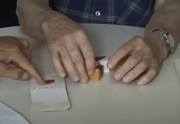8 everyday habits that could help you avoid a stroke, according to a nurse
- Replies 0
Strokes are a leading cause of disability and death, but what if you could significantly reduce your risk with a few lifestyle tweaks?
That's exactly what a seasoned neurocritical care nurse is advocating, and we at The GrayVine are here to share these pearls of wisdom with our community.
After all, prevention is the best medicine, especially when it comes to strokes.
Before we dive into the eight golden rules, let's grasp the gravity of the situation.
Each year, nearly 800,000 Americans experience a stroke, with a significant portion resulting in death.
Recognizing symptoms like facial and arm weakness, sudden speech difficulties, and vision loss is crucial, but why wait for warning signs when you can take action now?
The 8 Essential Lifestyle Habits to Embrace
1. Keep Cholesterol in Check
High cholesterol isn't just about numbers; it's a direct ticket to increased stroke risk. The UK Stroke Association warns that high cholesterol and blood pressure can multiply your stroke risk by 3.5 times.
The solution? Cut down on fatty foods, quit smoking, and moderate your alcohol intake. Simple changes can lead to significant improvements in your cholesterol profile.
2. Balance Your Diet
The Mediterranean diet isn't just a fad; it's a fiber-rich, balanced way of eating that's been shown to reduce stroke risk.
Think plenty of fruits, vegetables, whole grains, nuts, and olive oil. It's about nourishing your body with the nutrients it needs to function optimally and protect itself from harm.

3. Say No to Smoking
If you smoke, you're playing with fire. Smokers have a threefold risk of stroke compared to non-smokers, and heavy smokers' risk is even higher.
Beyond strokes, smoking invites a host of other health issues, including heart disease and vision problems. It's never too late to quit and reclaim your health.
4. Manage Blood Glucose Levels
High blood glucose is a silent threat that can creep up over time, increasing your stroke risk. A diet rich in fiber, staying hydrated, and managing stress are key to keeping those levels in check.
Remember, it's not just about avoiding sweets; it's about maintaining a balanced diet that stabilizes your blood sugar.
5. Prioritize Sleep
Sleep isn't a luxury; it's a necessity. Most adults need at least seven hours a night, but it's not just about quantity—it's about quality, too.
Consistent wake-up times and adding physical activity to your routine can improve your sleep. Be cautious, though, as too much sleep can also be a risk factor for strokes.
6. Monitor Blood Pressure
High blood pressure is a silent killer that can lead to strokes by damaging your blood vessels.
Regular check-ups are vital, especially if you're over 18. Catching high blood pressure early means you can make lifestyle changes to prevent further complications.

7. Maintain a Healthy Weight
Your “ideal” weight is unique to you, but being overweight or obese is a universal risk factor for strokes. Aim for a varied, balanced diet and regular exercise to manage your weight effectively.
It's not about chasing a number on the scale; it's about achieving a healthier, more resilient body.
8. Stay Active
Sedentary behavior is the enemy of good health. Skipping exercise not only leads to weight gain but also increases your stroke risk.
Even small amounts of physical activity can have a massive impact on your health. Aim for at least 30 minutes of exercise five times a week to reduce your stroke risk by a quarter.

Have you implemented any of these habits into your life? Do you have other stroke prevention tips to share? Drop a comment below and join the conversation!
That's exactly what a seasoned neurocritical care nurse is advocating, and we at The GrayVine are here to share these pearls of wisdom with our community.
After all, prevention is the best medicine, especially when it comes to strokes.
Before we dive into the eight golden rules, let's grasp the gravity of the situation.
Each year, nearly 800,000 Americans experience a stroke, with a significant portion resulting in death.
Recognizing symptoms like facial and arm weakness, sudden speech difficulties, and vision loss is crucial, but why wait for warning signs when you can take action now?
The 8 Essential Lifestyle Habits to Embrace
1. Keep Cholesterol in Check
High cholesterol isn't just about numbers; it's a direct ticket to increased stroke risk. The UK Stroke Association warns that high cholesterol and blood pressure can multiply your stroke risk by 3.5 times.
The solution? Cut down on fatty foods, quit smoking, and moderate your alcohol intake. Simple changes can lead to significant improvements in your cholesterol profile.
2. Balance Your Diet
The Mediterranean diet isn't just a fad; it's a fiber-rich, balanced way of eating that's been shown to reduce stroke risk.
Think plenty of fruits, vegetables, whole grains, nuts, and olive oil. It's about nourishing your body with the nutrients it needs to function optimally and protect itself from harm.

A neurocritical care nurse has detailed eight essential lifestyle habits to help prevent the occurrence of a stroke. Image source: Brooke Lark / Unsplash.
3. Say No to Smoking
If you smoke, you're playing with fire. Smokers have a threefold risk of stroke compared to non-smokers, and heavy smokers' risk is even higher.
Beyond strokes, smoking invites a host of other health issues, including heart disease and vision problems. It's never too late to quit and reclaim your health.
4. Manage Blood Glucose Levels
High blood glucose is a silent threat that can creep up over time, increasing your stroke risk. A diet rich in fiber, staying hydrated, and managing stress are key to keeping those levels in check.
Remember, it's not just about avoiding sweets; it's about maintaining a balanced diet that stabilizes your blood sugar.
5. Prioritize Sleep
Sleep isn't a luxury; it's a necessity. Most adults need at least seven hours a night, but it's not just about quantity—it's about quality, too.
Consistent wake-up times and adding physical activity to your routine can improve your sleep. Be cautious, though, as too much sleep can also be a risk factor for strokes.
6. Monitor Blood Pressure
High blood pressure is a silent killer that can lead to strokes by damaging your blood vessels.
Regular check-ups are vital, especially if you're over 18. Catching high blood pressure early means you can make lifestyle changes to prevent further complications.

Following a balanced diet, such as the Mediterranean diet, and maintaining a healthy weight are advised to reduce stroke risk. Image source: Unsplash.
7. Maintain a Healthy Weight
Your “ideal” weight is unique to you, but being overweight or obese is a universal risk factor for strokes. Aim for a varied, balanced diet and regular exercise to manage your weight effectively.
It's not about chasing a number on the scale; it's about achieving a healthier, more resilient body.
8. Stay Active
Sedentary behavior is the enemy of good health. Skipping exercise not only leads to weight gain but also increases your stroke risk.
Even small amounts of physical activity can have a massive impact on your health. Aim for at least 30 minutes of exercise five times a week to reduce your stroke risk by a quarter.
Key Takeaways
- A neurocritical care nurse has detailed eight essential lifestyle habits to help prevent the occurrence of a stroke.
- Key recommendations include managing blood glucose levels, cholesterol, blood pressure, and getting the right amount of sleep.
- Following a balanced diet, such as the Mediterranean diet, and maintaining a healthy weight are advised to reduce stroke risk.
- The article also emphasizes the importance of quitting smoking and reducing sedentary behaviour, with regular physical exercise suggested to lower the chance of stroke.
Have you implemented any of these habits into your life? Do you have other stroke prevention tips to share? Drop a comment below and join the conversation!






